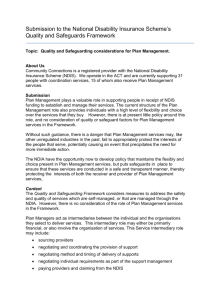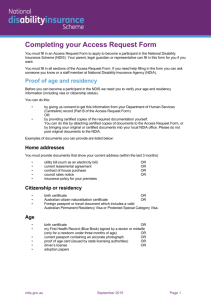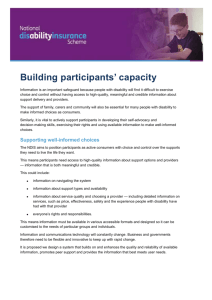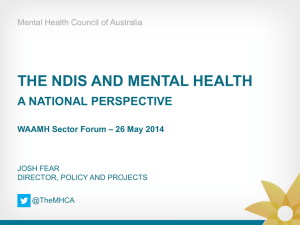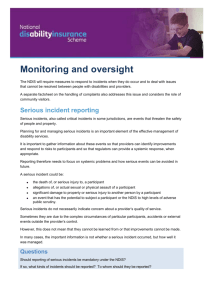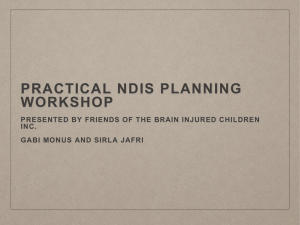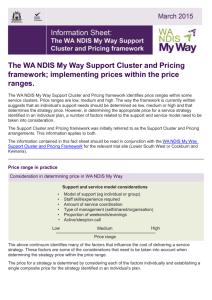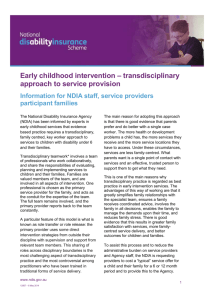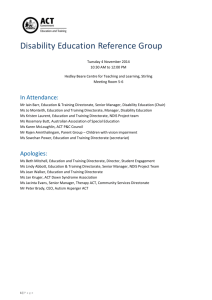Submission-Re-NDIS-Quality-and
advertisement
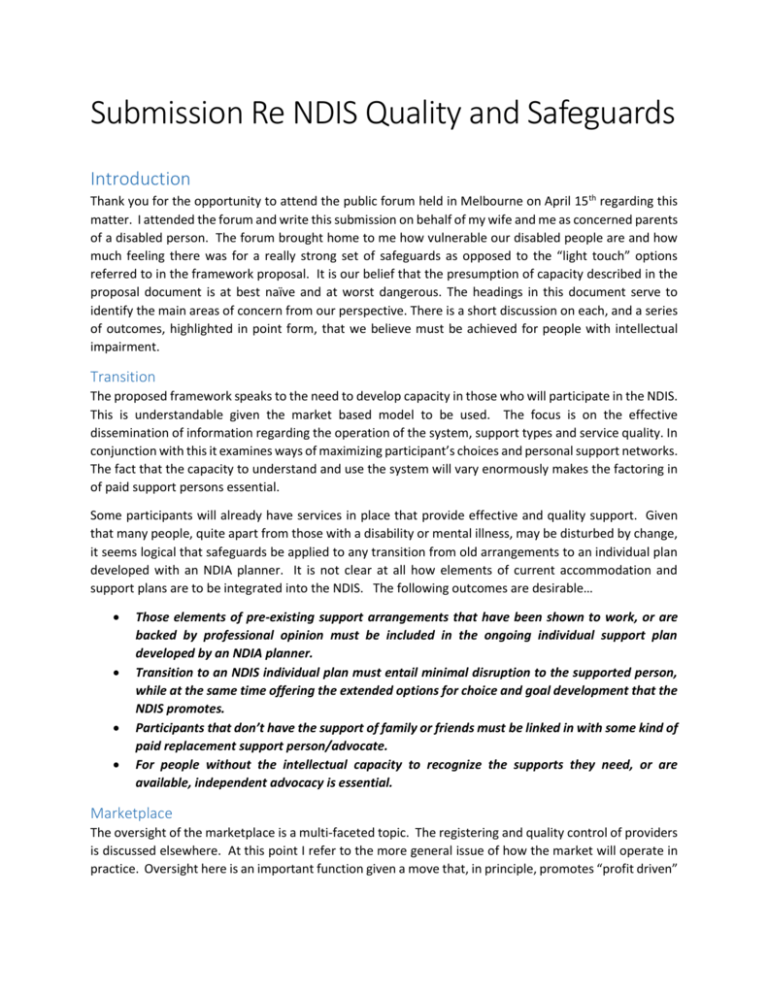
Submission Re NDIS Quality and Safeguards Introduction Thank you for the opportunity to attend the public forum held in Melbourne on April 15th regarding this matter. I attended the forum and write this submission on behalf of my wife and me as concerned parents of a disabled person. The forum brought home to me how vulnerable our disabled people are and how much feeling there was for a really strong set of safeguards as opposed to the “light touch” options referred to in the framework proposal. It is our belief that the presumption of capacity described in the proposal document is at best naïve and at worst dangerous. The headings in this document serve to identify the main areas of concern from our perspective. There is a short discussion on each, and a series of outcomes, highlighted in point form, that we believe must be achieved for people with intellectual impairment. Transition The proposed framework speaks to the need to develop capacity in those who will participate in the NDIS. This is understandable given the market based model to be used. The focus is on the effective dissemination of information regarding the operation of the system, support types and service quality. In conjunction with this it examines ways of maximizing participant’s choices and personal support networks. The fact that the capacity to understand and use the system will vary enormously makes the factoring in of paid support persons essential. Some participants will already have services in place that provide effective and quality support. Given that many people, quite apart from those with a disability or mental illness, may be disturbed by change, it seems logical that safeguards be applied to any transition from old arrangements to an individual plan developed with an NDIA planner. It is not clear at all how elements of current accommodation and support plans are to be integrated into the NDIS. The following outcomes are desirable… Those elements of pre-existing support arrangements that have been shown to work, or are backed by professional opinion must be included in the ongoing individual support plan developed by an NDIA planner. Transition to an NDIS individual plan must entail minimal disruption to the supported person, while at the same time offering the extended options for choice and goal development that the NDIS promotes. Participants that don’t have the support of family or friends must be linked in with some kind of paid replacement support person/advocate. For people without the intellectual capacity to recognize the supports they need, or are available, independent advocacy is essential. Marketplace The oversight of the marketplace is a multi-faceted topic. The registering and quality control of providers is discussed elsewhere. At this point I refer to the more general issue of how the market will operate in practice. Oversight here is an important function given a move that, in principle, promotes “profit driven” service provision. It seems from the following footnote from the proposal document that simply allowing market forces to drive the scheme has a high probability of failure… “The UK Government is introducing a market oversight regulatory function of adult social care from 5 April 2015. In response to significant provider failure, the market oversight function will initially focus on market failure, in particular monitoring financial sustainability and assessing the likelihood of business failure of difficult-to-replace adult social care provider organisations”. Note 17 P26. Some consequences of an unregulated market might include… A poorly paid workforce with a high turnover of employees A casualization of the workforce that works against stability and relationship building A workforce without sufficient opportunities to develop the skills and knowledge necessary for the understanding of complex clients Problems with pricing control Exploitation of the intellectually impaired Services beset with conflicts of interest that favour certain providers The last point, from my perspective, begs the question of who decides what services should cost. The proposal suggests that the NDIA sets its own pricing guidelines, and these will feed into the planning and budgeting for funding supports. Market forces, and the sustainability of business models will, however, affect what the market ends up charging. In a working market a gap may develop between what the NDIS is funding and what the participants must pay. There must be an independent body that oversees the marketplace and the NDIA. This body would monitor and regulate market issues, and might also be the best solution for the oversight of quality control and complaint handling. These issues should include, but not be restricted to… o Pricing guidelines and informing the government in regard to scheme funding o Provider spread and reporting on the ability of the marketplace to serve the scheme o Collusion and anti-competitive behavior o Predatory practice o Recognition in pricing of complex clients and the need, in cases of intellectual disability, to fund the co-ordination and management of their services Quality Control The vulnerability of the participants in this scheme demands careful consideration of how, and by whom, services are provided, monitored, regulated and quality assured. The proliferation of examples of greed and abuse in poorly regulated environments in recent times (e.g. Financial planners, Education providers and existing disabled and aged care providers) shows us that “light touch” regulation doesn’t work. We believe that the safeguards offered need to be in line with the highest proposed levels of quality control for those in vulnerable situations. The risk based approach will clearly give rise to some types of support that could be exempted or be subject to lesser safeguards but any reduction in safeguards from those mechanisms currently in place for the same kind of support would need very careful examination. The availability of market choice provides a mechanism whereby poor performers would lose out as the market matures but in the early stages there may not be enough information to reliably inform choice, even if the channels to make this available to participants were in place. Providers that offer any supports that fall into a high risk category, or work with intellectually disabled clients, must meet the highest level of quality control that includes mandatory independent quality assessment and certification at regular intervals. Provider organisations and their care staff must meet registration standards. Providers operating as individuals must also meet the highest standards where the service offered is in a high risk area. This should include some form of independent assessment – perhaps through spot checks. Persons who perform high risk support roles, as employees or as individuals, must have passed a working with vulnerable people check at a National level that includes barred person registers etc. A system of participant feedback and provider rating will be essential. The service offered by “Care opinion” might be considered for a role in this space. In order to ensure that providers are not discouraged from working in high risk support areas the cost of quality control certification should probably be subsidized. Current quality control activities, such as community visitors, that have been shown to be effective, must be incorporated into the new scheme in some way. Poor performers and those who break rules must not be able to hide elsewhere in the same marketplace (as financial planners were able to do). Complaints Again, the vulnerability of the participants in the scheme demands a simple and effective means of registering and remediating dissatisfaction. Providers should first be given the opportunity to fix the matter. Persistent or unresolved issues will need to be escalated, perhaps through a medium, such as that offered by “Care opinion” that can be accessed by participants or their advocates as the public face for complaints (that can be reduced, after remediation, to statistical data). Once accepted through an appropriate moderation process the complaint would need to be followed up by an independent body with the power to mediate and if necessary make a judgement on the continued registration of the provider concerned. Where a complaint cannot be resolved with the provider it needs to be escalated to an independent body with powers that enable resolution. The independent body must have the power to bar/deregister organisations, principals of organisations and employees who are found to have put their clients at undue risk or harm. Restrictive Practices Our family member with a disability has a rare syndrome caused by a genetic abnormality that necessitates restrictive practice in order to preserve health and well-being. Prader Willi Syndrome is a lifelong condition for which there is not currently any cure. The supports that are needed can and must be included in any support plan, and if necessary can be included in a positive behavior support plan. The plan could be reviewed from time to time in regard to how the restrictions are applied, but there is no option to remove the restrictions without exposing our family member to a downward spiral of obesity and anxiety related health issues culminating in death from one or another complication. The goal of eliminating restrictive practice is not reasonable in all circumstances and the needs of individuals to have freedom of choice must be carefully balanced against the ability to make those choices where there is a brain impairment that drives life threatening behavior. Phillip (contact through email – linpip@outlook.com)
